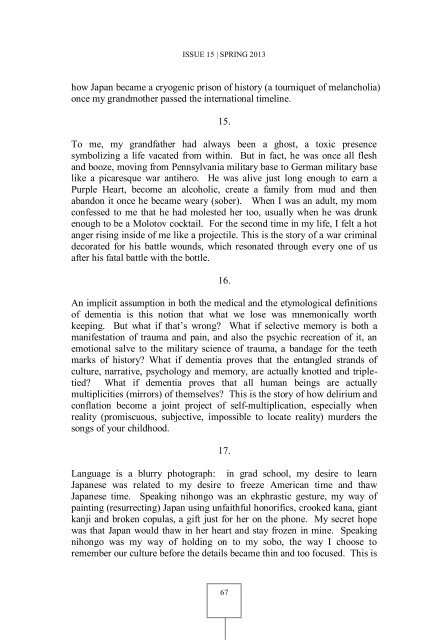You also want an ePaper? Increase the reach of your titles
YUMPU automatically turns print PDFs into web optimized ePapers that Google loves.
ISSUE 15 | SPRING 2013<br />
how Japan became a cryogenic prison of history (a tourniquet of melancholia)<br />
once my grandmother passed the international timeline.<br />
15.<br />
To me, my grandfather had always been a ghost, a toxic presence<br />
symbolizing a life vacated from within. But in fact, he was once all flesh<br />
and booze, moving from Pennsylvania military base to German military base<br />
like a picaresque war antihero. He was alive just long enough to earn a<br />
Purple Heart, become an alcoholic, create a family from mud and then<br />
abandon it once he became weary (sober). When I was an adult, my mom<br />
confessed to me that he had molested her too, usually when he was drunk<br />
enough to be a Molotov cocktail. For the second time in my life, I felt a hot<br />
anger rising inside of me like a projectile. This is the story of a war criminal<br />
decorated for his battle wounds, which resonated through every one of us<br />
after his fatal battle with the bottle.<br />
16.<br />
An implicit assumption in both the medical and the etymological definitions<br />
of dementia is this notion that what we lose was mnemonically worth<br />
keeping. But what if that’s wrong? What if selective memory is both a<br />
manifestation of trauma and pain, and also the psychic recreation of it, an<br />
emotional salve to the military science of trauma, a bandage for the teeth<br />
marks of history? What if dementia proves that the entangled strands of<br />
culture, narrative, psychology and memory, are actually knotted and tripletied?<br />
What if dementia proves that all human beings are actually<br />
multiplicities (mirrors) of themselves? This is the story of how delirium and<br />
conflation become a joint project of self-multiplication, especially when<br />
reality (promiscuous, subjective, impossible to locate reality) murders the<br />
songs of your childhood.<br />
17.<br />
Language is a blurry photograph: in grad school, my desire to learn<br />
Japanese was related to my desire to freeze American time and thaw<br />
Japanese time. Speaking nihongo was an ekphrastic gesture, my way of<br />
painting (resurrecting) Japan using unfaithful honorifics, crooked kana, giant<br />
kanji and broken copulas, a gift just for her on the phone. My secret hope<br />
was that Japan would thaw in her heart and stay frozen in mine. Speaking<br />
nihongo was my way of holding on to my sobo, the way I choose to<br />
remember our culture before the details became thin and too focused. This is<br />
67


